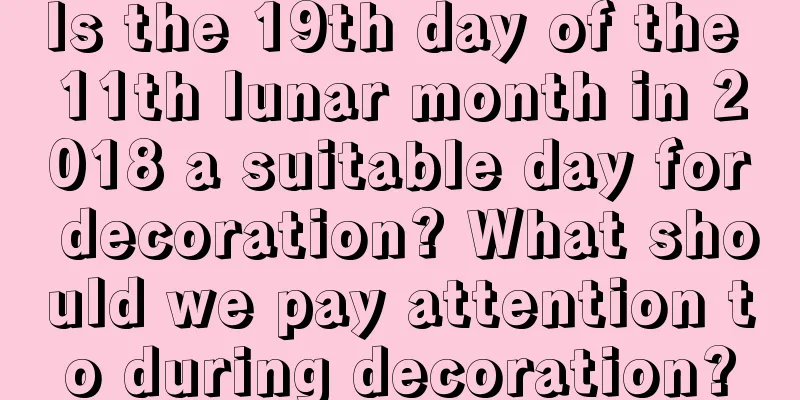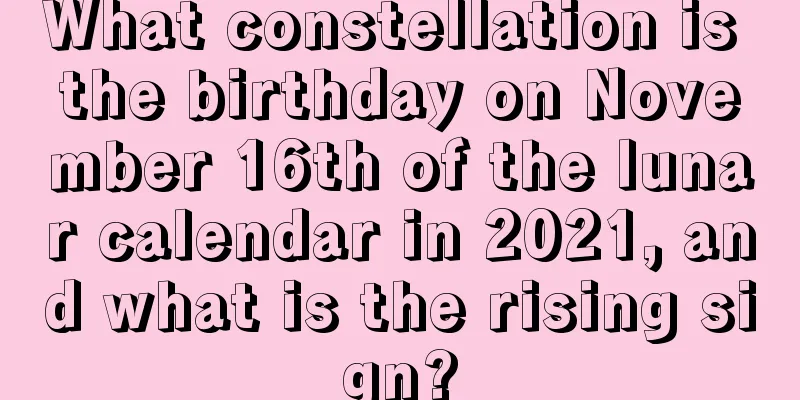Can’t you get a haircut during the 2019 Spring Festival? What are the taboos during the Spring Festival?

Introduction: The Spring Festival is one of the major traditional festivals, and there are many taboos to observe. So can’t we get a haircut during the Spring Festival in 2019? What are the taboos during the Spring Festival? The festive culture of the Chinese New Year is rich and colorful, and extraordinary. If you want to know more related content, just search in the 2019 Chinese New Year and Spring Festival special topic carefully compiled by Shuimoxiansheng.com!Can’t get a haircut during the 2019 Spring Festival?Not shaving your head in the first month of the lunar calendar refers to the custom that is prevalent in most parts of my country: "Don't shave your head in the first month of the lunar calendar, or your uncle will die." This custom originated around the time when the Qing government issued the shaving order in 1644.It is a misunderstanding that if you cut your hair in the first month of the lunar year, your uncle will die. The meaning of not cutting hair is "missing the past", which is a custom that has been passed down since the late Ming Dynasty and early Qing Dynasty. At that time, the Qing Dynasty ordered all citizens to cut their hair. Some people did not cut their hair during the first month of the lunar year to express their "nostalgia for the Ming Dynasty". But they could not openly confront the Qing government, so there was a saying that "cutting your hair in the first month of the lunar year will mean your uncle's death", which has been passed down to this day. In fact, the saying "getting a haircut in the first month of the lunar year will kill your uncle" actually comes from a "misunderstanding". According to research, after the Qing Dynasty entered the Central Plains in 1644, the government required all men to have a "shahu head", that is, shaving the hair on the forehead and tying a braid at the back of the head. As a result, many people combined the observance of traditional customs with the feeling of missing the Ming Dynasty, and agreed that no one would shave their heads during the first month of the lunar year. They named this action "Sijiu", which means "missing the past history". But as time passed, word of mouth and misinformation spread, and the homonym of "missing the past" was made into "dead uncle", thus becoming a folk custom that has been passed down to this day. In a sense, the core of Chinese culture is a kind of "human relations culture", which emphasizes fatherly love and filial piety, and brotherly friendship and respectful younger brother. This cultural background has caused the original "misunderstanding" to become a powerful force. With the development of society, people should be selective in the inheritance of "festival customs". Modern people should understand the cultural connotations of the Spring Festival in line with the times and change the way of celebrating the Spring Festival from "emphasizing rituals" to "emphasizing culture". People should not let a "misunderstanding" affect their normal lives. It is understood that in some large cities in southern my country, the rule of not cutting hair in the first month of the lunar year has gradually faded, but in a wider area of my country, this old "New Year custom" still exists, and people need to update their concepts. What are the taboos during the Spring Festival?Taboos on the first day of the Chinese New Year: Rooster Day - in the old days people would put up pictures on New Year's Day to ward off evil spirits and pray for good luck.Taboos on the second day of the Chinese New Year: Dog Day - going out to pay New Year’s greetings or worship ancestors. Taboos on the third day of the Lunar New Year: Sheep Day - "Red Mouth", prone to quarrels, not suitable for New Year's greetings. Taboos on the fourth day of the Chinese New Year: Pig Day - worship the God of Wealth. Taboos on the fifth day of the Chinese New Year: "Po Wu", which can break many taboos; the birthday of the Five Gods of Wealth, welcome the God of Wealth. Taboos on the sixth day of the Chinese New Year: Horse Day - the day to "send off the gods", shops begin to reopen. Taboos on the seventh day of the Chinese New Year: Renri - people’s birthday, gatherings for food and drinks, setting off fireworks, it is also the “birthday of fire”. Taboos on the eighth day of the Chinese New Year: Grain Day - the stars descend to the earth, and people should offer sacrifices to them. Temples set up altars on this day to offer sacrifices to the stars and accept donations. Taboos on the ninth day of the Chinese New Year: It is the birthday of the Jade Emperor and a grand ceremony to worship the Lord of Heaven is held. Taboos on the tenth day of the Chinese New Year: Birthday of Stone - Avoid using any stone tools such as millstones, pestles and rollers. The new wave of annual fortune in 2019 has already changed. Calculate your own fortune in advance, correct your mistakes if there are any, and encourage yourself if there are none, so that the new year will be smooth and safe. To calculate your new fortune in 2019, please click on the [Premium Calculation] below to learn about your new fortune. I wish you peace and happiness in the new year! |
>>: Is it auspicious to open the Zixin store on December 25, 2018?
Recommend
Is the lunar calendar date of the Beginning of Winter in 2019 suitable for raising the beams? What is the average temperature of the Beginning of Winter?
Introduction: Beginning of Winter is one of the 24...
What time is auspicious or inauspicious on November 27th of the lunar calendar in 2021? How to judge the auspiciousness or inauspiciousness of the time?
The eleventh month of the lunar calendar is the se...
Is the first day of the twelfth lunar month in 2021 a good year? What are the auspiciousness and inauspiciousness of each hour?
In ancient times, the twelfth month of the lunar c...
What will be the fate of those born in the winter solstice under the sign of Dog? Prediction for Dogs in Winter Solstice
"Destiny" has two meanings. One is fate,...
What are the best names for boys born on National Day in 2018?
Naming is indeed a very important matter, especial...
How is the third day of the fourth lunar month in 2021? Can I move into my new home?
Moving into a new house also requires choosing a g...
Is August 19th of the lunar calendar in 2022 a good date? Is it an auspicious day to propose?
The eighth lunar month is already halfway through....
Is the 16th day of the sixth lunar month in 2017 a good day? Is it appropriate to start construction on renovation?
Introduction: In our country, there is a custom th...
Is it a good day to have a heavy snow on the eleventh day of the lunar calendar in 2018? What is the sign of heavy snow today?
Introduction: Different solar terms represent diff...
Is the tenth day of the twelfth lunar month in 2021 a bad day? Can we get engaged and hold the wedding banquet?
Layue is another name for the month from Lesser Co...
What's missing from the five elements for people born on Chinese Valentine's Day in 2021, and how to name them?
Chinese Valentine's Day is a traditional Chine...
What is the zodiac sign of people born in December of the lunar calendar in 2017?
People born at different times have their own uniq...
Recommended auspicious days for bed installation in April of the lunar calendar in 2021
It is also necessary to choose an auspicious day t...
Can a daughter add to a grave during the Qingming Festival? What should women pay attention to when visiting graves during the Qingming Festival?
Although visiting graves on Qingming Festival is o...
Is the 16th day of the sixth lunar month in 2019 a suitable day for repairing graves? Check the auspiciousness and inauspiciousness of this day!
Introduction: Repairing a grave is an important ma...









